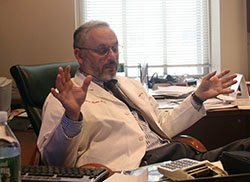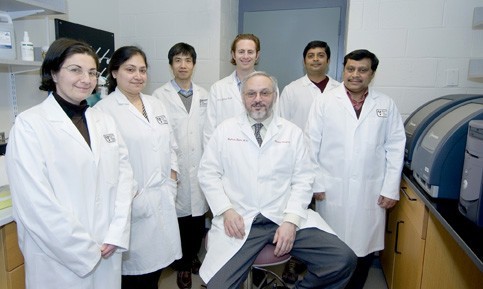Dr. Raphael Bueno’s research seeks to develop novel new tools for the diagnosis, prognosis, and treatment of thoracic cancers, including lung cancer, the leading cause of cancer fatality in the US for both men and women, and malignant pleural mesothelioma, a rare and deadly cancer of the pleura (the membrane that covers the lung and lines the chest wall cavity).
Background
Dr. Bueno attended Harvard College, majoring in biochemistry. During college and medical school, he worked at Dr. Boris Magasanik’s laboratory in the Department of Biology at MIT, concentrating on nitrogen regulation in E. coli and K. areogenes. He attended the Health Sciences and Technology (HST) program at Harvard Medical School, where he received his medical doctorate in 1985 after completing an honor’s thesis for which he received the Henry A. Christian award. In 1985 he began his graduate medical training as an intern in surgery at the Brigham and Women’s Hospital, followed by a surgical residency. In the midst of this surgical residency, Dr. Bueno spent two years in a research fellowship studying the insulin-like growth factor (IGF) receptor. He subsequently completed a cardiothoracic residency at the Massachusetts General Hospital and was recruited back to the Brigham and Women’s Hospital in 1996 to establish a thoracic surgery practice and research laboratory.
Research
Hailing from the Midwest, Dr. Aster attended undergraduate school at the University of Michigan in Ann Arbor. He continued his postgraduate studies at the University of Michigan School of Medicine, where in 1987 he received a medical degree as well as a Ph.D. in human genetics. “While I was in medical school I really became attracted to pathology based on my perception that this field offered a great opportunity to couple clinical and research interests. When I asked the chairman of the department of pathology at Michigan, Dr. Peter Ward, ‘what is the best pathology department in the United States?’ he told me without question that it was Ramzi Cotran’s program at Brigham and Women’s Hospital. I rotated through the pathology department as a medical student in the fall of 1986 and was fortunate enough to gain entry to the program. I’ve never looked back.”
In the fall of 1987, Dr. Aster became a resident in pathology under the noted Dr. Cotran. He completed his fellowship in hematopathology in 1990, and three years later a fellowship in molecular oncology. He was named an assistant professor of pathology at the Harvard Medical School in 1996 and in 2000 was promoted to associate professor. In addition to numerous publications, professional honors, and hospital appointments, Dr. Aster is a co-leader of the Cancer Research Center of the Brigham Biomedical Research Institute, Deputy Director for Membership of the Dana Farber/Harvard Cancer Center, and leads the multi-institutional program project grant on oncogenic notch signaling, which is supported by the National Cancer Institute (NCI).

Laboratory
Dr. Bueno’s close-knit laboratory staff numbers four postdoctoral fellows and one technician, in addition to his colleague and collaborator, Dr. Gavin Gordon, who did his original postdoctoral fellowship in Dr. Bueno’s laboratory.
Collaborations
Dr. Bueno and his colleagues have many local, national, and international collaborators, including Jonathan Glickman of the Department of Pathology and Francine Jacobson from the Department of Radiology at Brigham and Women’s Hospital. Other key collaborators include Rick Jensen from the University of Massachusetts-Boston, Ravi Salgia from the University of Chicago, and Karl Kelsey from the Harvard School of Public Health.
funding

Dr. Bueno is funded principally by grants from National Cancer Institute, although he receives significant other public and private support.
Importance of Being at the Brigham
“The value of the Brigham,” Dr. Bueno emphasizes, “is that there are many remarkable people here who have profound clinical roles, and yet also conduct research at a very high level using the most innovative tools available to probe cancers of every type.”
Future
Dr. Bueno proposes to establish a multicenter mesothelioma study group, including a tumor bank that extends across institutions. He is studying the application of the gene ratio technique to other cancers, including lung and prostate. In addition, his laboratory is using novel technologies to better characterize relevant pathways in thoracic cancers with the goal of improving therapies and outcome.
Selected References
De Rienzo A, Richards WG, Yeap BY, Coleman MH, Sugarbaker PE, Chirieac LR, Wang YE, Quackenbush J, Jensen RV, Bueno R. Sequential Binary Gene Ratio Tests Define a Novel Molecular Diagnostic Strategy for Malignant Pleural Mesothelioma. Clin Cancer Res. 2013 May 1;19(9):2493-2502. Epub 2013 Mar 14. PubMed PMID: 23493352; PubMed Central PMCID: PMC3644001.
Oxman DA, Issa NC, Marty FM, Patel A, Panizales CZ, Johnson NN, Licona JH, McKenna SS, Frendl G, Mentzer SJ, Jaklitsch MT, Bueno R, Colson Y, Swanson SJ, Sugarbaker DJ, Baden LR. Postoperative Antibacterial Prophylaxis for the Prevention of Infectious Complications Associated With Tube Thoracostomy in Patients Undergoing Elective General Thoracic Surgery: A Double-blind, Placebo-Controlled, Randomized Trial. JAMA Surg. 2013 May 1;148(5):440-6. doi: 10.1001/jamasurg.2013.1372. PubMed PMID: 23325435.
Sugarbaker DJ, Gill RR, Yeap BY, Wolf AS, DaSilva MC, Baldini EH, Bueno R, Richards WG. Hyperthermic intraoperative pleural cisplatin chemotherapy extends interval to recurrence and survival among low-risk patients with malignant pleural mesothelioma undergoing surgical macroscopic complete resection. J Thorac Cardiovasc Surg. 2013 Apr;145(4):955-63. doi: 10.1016/j.jtcvs.2012.12.037. Epub 2013 Feb 21. PubMed PMID: 23434448.

